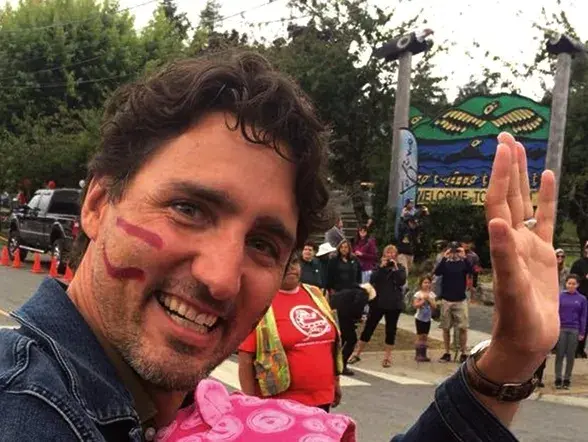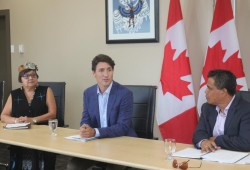Grieving the recent loss of his close friend Richard Lucas Jr., elected Tseshaht First Nations Chief Councillor Wahmeesh (Ken Watts) speaks with a heavy heart.
He reflected on Justin Trudeau’s reign as the 23rd prime minister of Canada with compassion.
“The world of politics has changed a lot,” said Wahmeesh, whose late father Wameesh (George Watts) had a prolific career in First Nations politics.
“It’s always been ugly, but right now it’s so personal. I don’t necessarily agree with the things (Trudeau) said or did over the years, but I’m not going to go there and overstep the line. Politics have gone too far,” he continued.
Wahmeesh brought up all the “nasty comments” on social media the exiting prime minister faced, plus the folks yelling at him.
On a skiing vacation in Rossland’s RED Mountain Ski Resort over the Christmas break, a woman was recorded saying, “Mr. Prime Minister, please get the f*ck out of B.C. You suck.”
To which Trudeau responded, “Have a wonderful day, ma’am.”
“It’s a sign of the state of the world we live in, and because of the economy. People are just fed up and people are pointing the figure entirely at him,” Wahmeesh said. “We all need to treat each other better. My late friend R.J. that passed away, he treated everyone so nice. I think we all need to try live in a better world. We need to be respectful of how we treat each other.”
Trudeau announced his resignation as prime minister on Jan. 6, 2024 at Rideau Cottage in Ottawa. The father of three has been the leader of the Liberal Party since 2013 and the prime minister since 2015.
“We are at a critical moment in the world,” Trudeau said in his resignation speech.
“As you all know, I’m a fighter. Every bone in my body has always told me to fight because I care deeply about Canadians. I care deeply about this country, and I will always be motivated by what is in the best interest of Canadians,” he continued. “And the fact is, despite best efforts to work through it, Parliament has been paralyzed for months after what has been the longest session of a minority Parliament in Canadian history.”
Trudeau’s legacy
Spending on Indigenous priorities increased significantly during his tenure, with about $32 billion forecast in the 2024-25 budget compared to the roughly $11 billion that was invested in Indigenous priorities in 2015, according to the Department of Finance Canada.
With the support of his Liberal ministers, the snowboarding, surfing and jet-setting prime minister’s government also launched a national inquiry into missing and murdered Indigenous women and girls, passed the United Nations Declaration on the Rights of Indigenous Peoples Act and created a new national day to honour the children who never returned home and the survivors of Indian residential schools.
But the hypocrisy of the Liberal leader who legalized cannabis was in plain sight after he skipped the first National Day for Truth and Reconciliation on Sept. 30, 2021, and took his family on vacation in Tofino, B.C.
Along the same vein, Trudeau’s Liberals pledged to end long-term drinking water advisories on reserves. But when the Shamattawa First Nation launched a national class-action lawsuit to address the long-standing lack of clean drinking water, Justice Canada lawyers argued the contrary in Federal Court, saying that “the government has no legal obligation to ensure First Nations have access to clean drinking water.”
Cloy-e-iis (Judith Sayers), the president of the Nuu-chah-nulth Tribal Council (NTC), thinks the Liberal Party was due for a new leader.
“The question is, can they gain enough popularity before the next election, because the Nuu-chah-nulth will really suffer under Pierre Poilievre, I’m sure,” said Cloy-e-iis.
In a written statement, BC Assembly of First Nations Regional Chief Terry Teegee thanked the outgoing prime minister for his leadership and service. He called upon the Liberal Party of Canada to elect a “strong, principled leader who will recommit the party to progressive values, bring Canadians together, and take the necessary steps to honour, recognize and implement the internationally recognized human rights of First Nations peoples throughout this country.”
“What we really need this Liberal government to do is to implement changes, not just talk about them, but to actually implement them and do what is necessary as the First Nations require it, especially for natural resources,” Cloy-e-iis added.
“I don’t think First Nations are a priority with the Conservatives. Definitely not. I’m sure that they’ll probably cut back on some of the services that were increased,” she said.
Wahmeesh said the collective shift in the polls from supporting a Liberal left to the Conservatives is because people are frustrated at the state of the country.
In late December 2024, the non-profit Angus Reid Institute showed voter support for the Liberal Party at just 16 per cent – possibly the lowest voter intention the Liberals have ever received in the modern era, according to Angus Reid.
“The cost of living is at the heart of all,” said Wahmeesh. “The new government needs to find a way to reduce the price of fuel and (Trudeau’s) replacement needs to find a way to make life more affordable. Whether they are First Nations or not, everybody is feeling the crunch.”
“Whatever it is we are doing right now is not really working. The system is not working. People are still dying,” noted Wahmeesh, referring to the opioid crisis in Canada.
The Government of Canada reported a total of 49,105 apparent opioid toxicity deaths between January 2016 and June 2024. The latest B.C. provincial reports show the number of unregulated drug deaths in October 2024 equals about five deaths per day.
In September 2024, the Nuu-chah-nulth Tribal Council declared a State of Emergency due to the mental health and opioid crisis, with fatalities that disproportionately affect the First Nations communities at six times the rate of other B.C. residents, reports the First Nations Health Authority.
Cloy-e-iis stressed that regardless of who comes into power, there are some really critical issues on the horizon that will require teamwork.
“We’re going to need to work all together to face some of these threats that are coming from the south,” she said. “We’ve always known our water was at risk. That’s why we always try to negotiate at the treaty tables that water was ours and we would share.”
Parliament is prorogued, or suspended, until March 24, effectively preventing a non-confidence vote in the House that could have spurred an election. The Liberals will elect a new leader over the next two months, and most pundits are currently predicting a national vote in May 2025.


